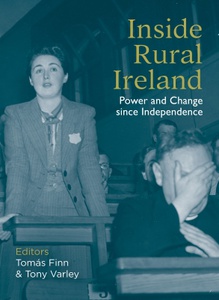RHN 140/2024 | Publication
Tomás Finn and Tony Varley (eds.), Inside Rural Ireland. Power and Change since Independence (University College Dublin Press, 2024).
In the early decades of native rule rural Ireland – and in particular the new farmer-owners who had emerged as the major winners in the recent agrarian revolution – exerted a considerable influence over the new Free State and over Irish Catholicism. Patriarchal power on the land had been strengthened by the transfer of land ownership from landlord to tenantfarmer and was given further strength by patriarchal Catholicism and patriarchal nationalism. After 1932 the strides protected import-substituting industrialisation was making never went nearly far enough to threaten agriculture’s economic primacy or the countryside’s central position in Irish society. Inspired by the traumatic experience of severe crisis conditions in the 1950s, a transformation that set southern Ireland on the path of urban industrialism commenced in earnest in the 1960s.
What emerges is that the power of the state to promote rural change has at once contracted and expanded in the years since Ireland joined the EEC in 1973. Views are divided as to how urban industrialism has impacted on different rural interests. Throughout much of the period since the 1950s the power of organised farmers to represent Irish farming interests remained high as those working the land continued to dwindle in number. In recent decades the always limited power of clerical activists and intellectuals to restructure rural civil society along Catholic (or even Christian) lines has undergone further decline. Most recently the prospects for farm women increasing their relative power have arguably improved the most in certain respects, even if land ownership still remains stubbornly and overwhelmingly in male hands.
Inside Rural Ireland delves deeply into the evolution of Ireland’s rural history to explore rural Ireland before and after these momentous transitions by examining the power of ruling politicians and state bodies, farmers, clerical and non-clerical civic activists, intellectuals (social commentators as well as fiction writers), returned emigrants, and farm women to promote or impede a wide range of rural changes.
Source: UCD Press
